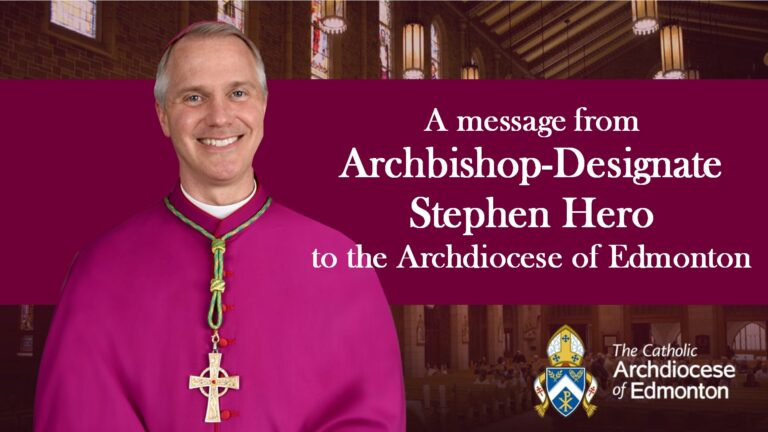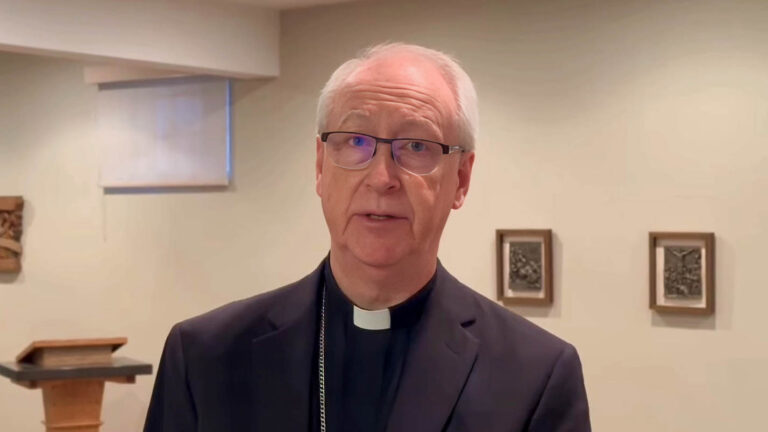“Red Mass” for the Saint Thomas More Lawyers’ Guild
Homily
[Jonah 3:1-10; Psalm 130; Luke 10:38-42]
Once again, we have the blessing of gathering together as members of the Saint Thomas More Lawyers’ Guild to celebrate what we call the Red Mass. The colour derives from the particular liturgy we celebrate – the Votive Mass of the Holy Spirit – and the blood our patron shed in witness to the faith. It is a moment in which we take seriously a question that for many has long lost its seriousness, but which, for members of the Guild, rests at the heart of your lives as Christians and your profession as judges and lawyers. I speak of the question of how your legal practice is informed by the insights of faith.
That is a question upon which we could spend hours of reflection, discussion, and debate. What we are given in the Gospel this evening is the pivot around which all such dialogue must revolve if it is to reach meaningful and hopeful resolution. In order to make this case, allow me to enter some evidence into these proceedings. Specifically, I draw your attention to the central feature of the newly refashioned interior of this church.
The symbolic motif informing the design is that of dwelling. The four polls, crossed at the top, evoke the tipi, a traditional Indigenous dwelling place. In its interior is another abode, what in Catholic tradition we name the tabernacle, where resides the Blessed Sacrament. Together, these two dwellings communicate in both reality and symbol the wondrous truth enunciated in the citation from the Gospel of Saint John, written above the sanctuary: “the Word was made flesh and dwelt among us.”
For our purposes this evening, I suggest we do well to ponder what is being claimed in this remarkable announcement. In it, “word” is our English translation of the Greek logos. It does signify “word”, yet its field of meaning also encompasses such terms as reality, wisdom and revelation. In other words, what Saint John is teaching is that in Jesus Christ, the Logos made flesh, we are given the meaning of all reality, the wisdom that comprehends it, and the revelation that makes it known to human minds and hearts (cf. Peter Kreeft, The Platonic Tradition).
Small wonder, then, that Jesus says of Mary that she chose “the better part”, the one necessary thing, when she sat at his feet to listen to him. In listening to Jesus, we hear the Word, the Logos, in whom we have revealed to us the fullness of truth and plenitude of understanding. Jesus does not criticize Martha’s activity, but makes clear that all action must yield the priority to contemplation of the Word made flesh in him.
Note that this exchange among Jesus, Mary, and Martha unfolds in the dwelling of the two sisters. Implicit here is the signal that Jesus wishes to enter our dwelling places as well. Were we to ask our patron saint what this might mean in practical terms for members of the legal profession, as he was, I expect he would turn our attention to that dwelling place we call conscience. There Jesus wishes to encounter and speak with us.
According to the mind of the Church, conscience is the human being’s “secret core” or “sanctuary”, the dwelling place where one is alone with God, and in the depths of which God’s voice echoes. There one discovers a law, God’s law, which, precisely because it is divine, must be obeyed (cf. CCC, 1776). We perceive right away how different this is from what today goes erroneously by the name of conscience, understood as subjective opinion and the capacity to decide ourselves what is good or evil. No, conscience is that inner dwelling place, where we, as his disciples, consciously sit at the feet of Jesus to receive from him what is good or evil, right or wrong, by contemplating the teaching he has given to and through his Church. Action then flows from contemplation by means of judging what must be done or avoided in light of what we have learned to be true.
Those who practice law are very busy people, to say the least. To borrow from the Gospel, we could say metaphorically that Martha is your middle name! Yet, if one is to realize a faith-informed practice of the law, Mary must become the first name, so that both contemplation and action find their proper order and balance in the exercise of our calling as disciples of Jesus Christ. This will play out in a myriad of ways in the ever-developing and increasingly complex context in which law is practiced. What must remain constant within the exercise of your noble profession is the welcoming of the Word-made-flesh into the abode of conscience, there placing oneself at his feet, and listening to his every Word in order to know what must be done or avoided.
The example of Saint Thomas More reminds us that fidelity to the dictates of conscience may run us afoul of secular authorities or popular mindset. Holding fast can be no small challenge. This is why we gather as a guild for this Red Mass. Here the Word, the Logos, becomes flesh in the sacrament of the Eucharist, so that by our reception of Holy Communion Jesus may dwell anew within our hearts. By the grace of this sacrament, may we live from his strength, and act in accord with the Truth we contemplate in him.
Most Reverend Richard W. Smith
Sacred Heart Church of the First Peoples
October 10th, 2023


